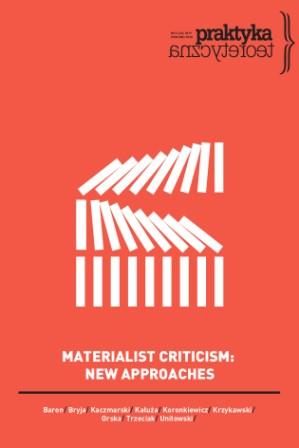Obcy Albert Camus? Przechwycenie jako postkolonialna strategia pisania na przykładzie Sprawy Meursaulta Kamela Daouda
Is Albert Camus a stranger? Détournement as a postcolonial strategy of writing in Kamel Daoud’s The Meursault Investigation
Author(s): Izabela BryjaSubject(s): Comparative Study of Literature, French Literature, Structuralism and Post-Structuralism, Psychoanalysis, Theory of Literature
Published by: Uniwersytet Adama Mickiewicza
Keywords: postcolonialism; détournement; Kamel Daoud; canon; Albert Camus;
Summary/Abstract: The author makes a comparative study of The Meursault Investigation by Kamel Daoud and Albert Camus’ works (especially The Stranger and The Fall) based on the literature describing the category of détournement. The theoretical basis of the notion of détournement is reconstructed from the works of Guy Debord, Jacques Derrida and Judith Butler and it becomes the basic category in the interpretation of postcolonial literature. The main aim of the article is to highlight the importance of this category as one of the strategies of postcolonial writing. The author claims that the purpose of using interception in literature is to renegotiate the structure of the canon and position of writers excluded from its structure because of economic, political and cultural conditions. In the first part of the article, the author points out the essential differentiators of détournement. She introduces the formula of the structure of the literary canon created by David Damrosch. Next she analyses two literary narrations dialoguing with each other. Comparison of the canonical story about Meursault’s murder and trial by Camus and The Meursault Investigation by Daoud reveals a strict relation between these novels. In Daoud’s story, the narration is inverted—the perspective of a victim, which is expressed by the brother of nameless Arab, dominates in the book. The analysis ends with the conclusion that détournement of a canonical work, and its recontextualization, is a more revolutionary gesture, made by postcolonial writers, who want to renegotiate their position in the structure of the canon, compared to nativist, utopian reproduction of the precolonial past. The choice of this particular strategy of writing confirms the truth of two claims of which Daoud is aware (as evidenced in novel): first, that every literary work is iterable and, second, that every revolution is only an apparent renouncement.
Journal: Praktyka teoretyczna
- Issue Year: 2019
- Issue No: 34
- Page Range: 239-254
- Page Count: 16
- Language: Polish

